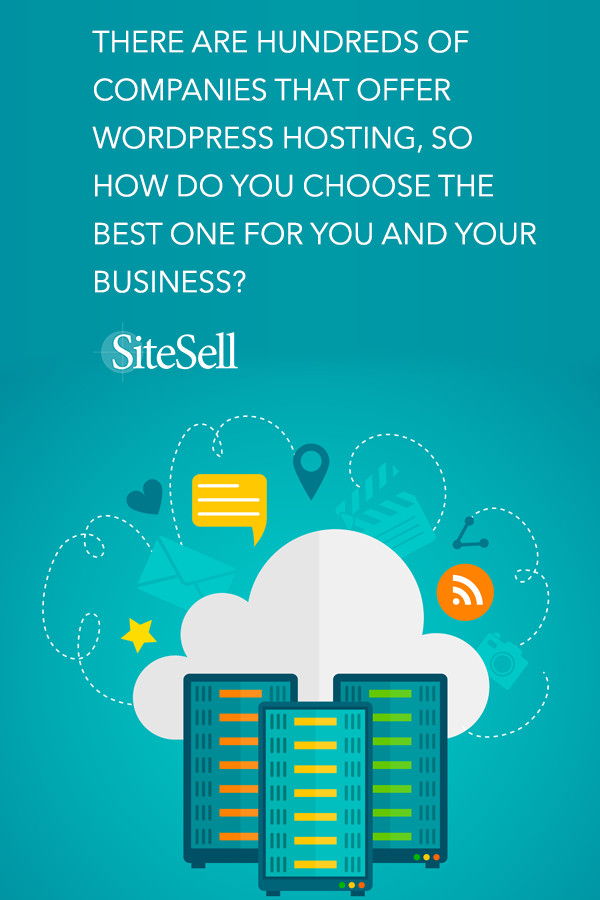Before you open the virtual doors to your online business, you’ll need to host your site somewhere. While there are hundreds of companies that will host your site, how do you choose the best WordPress hosting for you and your business?
There are six different types of hosting:
- Free
- Shared
- Virtual Private Server
- Dedicated Server
- Managed
- Your own Server
Free WordPress Hosting
Free hosting exists, but if you’re planning to run a business, it’s best to avoid this option. While it may not cost you actual money, there will be a price. Usually it’s seeing their advertising on your site.
This is counterproductive for your business because it draws traffic away from your site without compensation, and you will have little control over what’s being advertised. Additionally, free shared hosting is notoriously slow, which will affect your search rankings.
Shared WordPress Hosting
This is the most common type of entry-level hosting. The price is low because many websites are hosted on the same, shared server. Before choosing a host, think about your needs, and make sure the shared hosting will be able to meet them.
Keep in mind that page load speed is important — if your web page doesn’t load quickly, you’ll pay a penalty in the search results. You’ll also lose impatient site visitors, who will simply leave if your site doesn’t load quickly enough.
Although they advertise “unlimited” usage, most shared hosts will penalize you or force you to upgrade if your site uses too much processing power, or exceeds some other guideline. Read the fine print carefully.
Shared WordPress hosting is a great place to start, while you’re getting your business off the ground. At some point, though, you’ll likely outgrow it (and that’s a good problem to have).
Virtual Private Server for WordPress Hosting
A VPS (virtual private server) is set up to run as if it were a totally independent server, even though several websites will share the server resources. However, a VPS will host fewer sites than a shared hosting server.
A traditional VPS requires that you have some knowledge of how to configure and run your own server. If you don’t have the expertise, then be prepared to hire someone who does or choose a managed VPS.
A VPS is a good intermediate step for a blog with lots of traffic, or a medium-sized business.
Dedicated WordPress Hosting Server
This is like having your own server in your own office, except that the hardware is owned and operated by the hosting company. It gives you complete control over everything — hardware and operating system. It requires that you know how to run a server, so if you don’t, go with a managed version.
A dedicated server isn’t necessary until you have a lot of traffic.
Managed WordPress Hosting
If you set up your website with a WordPress managed hosting service, they take care of everything in the back end. They install WordPress, manage security, back up regularly, and sometimes exercise control over the themes and plugins you install.
It’s headache-free hosting, but you need to generate enough revenue to cover the additional expense.
Your Own WordPress Hosting Server
If you have the skills, and the money to invest in the hardware and software for a dedicated server, this may be a good option. The downside is, you’ll have to manage everything yourself, and have backup plans for when you’re away. This is not a practical solution for most of us.
Minimum WordPress Hosting Requirements
Whichever hosting solution you choose, WordPress.org recommends an Apache or Nginx server meeting these minimum requirements to run WordPress correctly:
- PHP 5.2.4 or greater (PHP 5.4 or greater is recommended)
- MySQL version 5.0 or greater (version 5.5 or greater is recommended)
- mod_rewrite Apache module
While WordPress can run on any server that meets those requirements, it’s been my personal experience that Windows servers tend to have issues running WordPress, so it’s best to stick with the Apache or Nginx servers.
And for better security, ask if the host you’re considering runs something called suPHP. It’s not required, but it increases your site’s security because it allows your version of WordPress to run using your username instead of the host’s.
For more resources on building, not just a great WordPress website, but a great business, take a look at SBI! for WP. Unmatched business learning is paired with powerful research tools, all available in a 30 day free trial.

Latest posts by Susanna Perkins (see all)
- How To Review, Reinvent And Revitalize Your Growing Solopreneur Business - September 8, 2016
- 6 Tools to Help You Corner Your Share of a $107 Billion Industry - July 11, 2016
- WordPress – Not Just for Bloggers Any More - July 6, 2016


